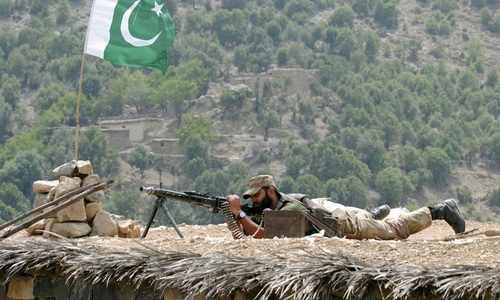
GEN Bajwa hands over a list of 76 terrorists based across the border to the Afghan embassy in Islamabad. The Afghan government hands over a list of 85 terrorists it claims are operating from within Pakistan. Our army chief summons Afghan diplomats to GHQ. The Afghan army deputy chief summons our ambassador in Kabul to his office. And on goes the blame game between the two countries, even as thousands are killed by terrorists on both sides of the border.
Pakistan and India play the same game across their border and the LoC. India blames Pakistan for a string of attacks on its soil, while we blame the Indians for financing and arming nationalist insurgents in Balochistan. While all three countries are suffering from terrorism, they are unwilling to cooperate in order to crush this menace.
In any objective evaluation of the situation, it must be admitted that it is Pakistan that has pioneered the use of non-state actors to further its agenda in the region. And, more often than not, it has used faith as a rallying cry.
It launched tribal zealots into Kashmir a few weeks after independence, and the resulting war with India led to an unending deadlock between the two countries. Before a full-fledged war broke out over Kashmir in 1965, plain-clothed Pakistani soldiers infiltrated India-held Kashmir with the intent of fomenting an uprising.
Invoking the ‘good vs bad terrorists’ doctrine has not worked.
In 1971, the military used the militant wing of the Jamaat-i-Islami in East Pakistan (now Bangladesh) in an attempt to crush the nationalist freedom struggle there. Millions of Bengalis fled across the border, providing India with a reason to attack and defeat our army. A few years later, president Daud indicated that the PPP government was attempting to destabilise his administration in Kabul.
After the Soviet invasion in 1979, Pakistan joined with the US and Saudi Arabia to arm, finance and train jihadists from across the Muslim world. Then known as freedom fighters, these ‘holy warriors’ committed many atrocities that were conveniently overlooked at the time. And when the defeated Red Army pulled out in 1988, thousands of trained jihadists turned their guns on targets in Afghanistan, Pakistan and India-held Kashmir. A few years later, the Afghan Taliban began their reign of terror, lasting until they were toppled in the aftermath of 9/11 and then allegedly finding refuge in Balochistan. Since then, they have used the province as a platform for attacks against Afghan and US-led coalition forces.
Another group that has created mayhem in Afghanistan is the Haqqani network. Based in Pakistan’s tribal areas, these terrorists have been largely exempt from attacks by Pakistani security forces. The unstated excuse is: they do not pose a threat to Pakistan, so why provoke them? Groups active in IHK are similarly shielded.
But invoking the ‘good versus bad terrorists’ doctrine has led us to where we are. With this backdrop, should we be surprised that India and Afghanistan are paying us back in our own coin?
I have little doubt of Indian involvement in the Balochistan uprising. Why would Indian intelligence not take advantage of local grievances and nationalist aspirations in our biggest and most backward province? And there is solid evidence regarding Indian assistance for the MQM. Again, most governments would fish in the troubled waters of a hostile neighbour’s biggest city.
Afghanistan, too, has permitted a number of anti-Pakistan jihadist groups to operate from its soil. But in all fairness, it doesn’t control large swathes of the territory along our border. This, of course, was equally true of Pakistan until the security establishment got serious about clearing Fata of the hydra-headed monsters it had itself created.
Most bordering states that have suffered from years of terrorist violence would muster up the maturity to put political differences aside and cooperate in excising this cancer. Sadly, successive governments in Afghanistan, India and Pakistan have been too weak and self-serving to take the hard decisions needed to sit down and work together.
The basic problem lies in Pakistan, where three generations of generals have been trained to see the world through Kashmir-tinted glasses. The obsession with the perceived threat from India has blinded them to other security concerns. After having seen the difficulty of crushing rural-based jihadists in ungoverned areas where they have safe havens, they have still been unable to draw the obvious conclusion.
For its part, India has been less than helpful. By fielding around 20 army divisions on our border, it has ensured that it poses an existentialist threat to us, thereby forcing the Pakistan Army to respond. Also, the worst nightmare for our military planners is encirclement by both our neighbours.
But overcoming this threat calls for better relations with Afghanistan. This cannot be achieved by allowing the Afghan Taliban and the Haqqani network sanctuary in Pakistan.
Published in Dawn, March 4th, 2017















































